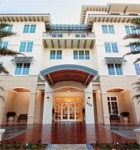
The Horizon Bay at Hyde Park project was the first independent- and assisted-living retirement community built in south Tampa Bay in more than 20 years. Through the firm’s Eco Friends Program, nine Horizon Bay communities have earned the EPA’s Energy Star certification.
“In the design of senior housing, green products and sustainability definitely have a place,” says John Sattelmayer, senior vice president of facilities for Horizon Bay Retirement Living. He should know: with 93 properties in 19 states, Sattelmayer’s company is a regionally diverse senior-focused property-management firm. And through its Eco Friends Program, the company is regarded as a leader in creating sustainable senior-living facilities from existing structures.
Launched in 2007, Horizon Bay’s Eco Friends Program is a multifaceted initiative that takes a comprehensive approach to implementing sustainable practices in existing buildings—all of which are at least 20 years old—and positioning those buildings for the future. The program recently caught the attention of the Assisted Living Federation of America, which awarded the program and Horizon Bay with a 2011 Best of the Best award in the Physical Plant and Environmental category.
Actions of the Eco Friends Program have included developing and meeting new benchmarks for each building in anticipation of Energy Star’s new standard for senior housing; educating residents and staff on managing a building’s impact on the environment; and vendor partnering to offer sustainable packaging, extensive recycling, and paperless invoicing. Since 2008, paperless invoicing alone has saved more than 1.1 million sheets of paper.
The program also focuses on actively engaging the residents via Q&A sessions, project explanations, and mechanical-room tours. “Part of what [residents] want is a green building and green products,” Sattelmayer says. “Folks are very curious, and it’s important that they’re onboard. We want to assure them that the noise behind the wall is for their betterment.”
Horizon Bay and a hired green-building design firm—is currently in the process of renovating six of its retirement-living facilities, five of which are in Denver. The typical retrofit project costs around $2 million and encompasses 300,000 square feet. And though each renovation project is different and the company doesn’t maintain a “cookie-cutter” design, there are some constants to each project. First, the company always eyes opportunities to bring the outdoors inside via daylight harvesting. Second, it focuses on installing energy-efficient lighting and carpeting comprised of recycled content. Another constant is the resulting benefits. “You see the benefits every day on the utility bills and from the residents,” Sattelmayer says. “They’re excited about the new look and feel of their home.”
Through the Eco Friends Program, nine Horizon Bay communities have earned the EPA’s Energy Star certification, which signifies that each of its buildings performs in the top 25 percent of similar facilities nationwide in terms of energy efficiency and meets strict EPA-set energy-efficiency-performance levels. This figure is likely to increase as the property-management company gears up to renovate an additional eight properties in 2012.
Aside from renovations, the company has also garnered attention for its Horizon Bay at Hyde Park project, which was the first independent and assisted-living retirement community built in south Tampa Bay in more than 20 years. Completed in 2011, the six-story, 153,000-square-foot urban high-rise is a brownstone building featuring 136 units, plush amenities, and fine dining—proving that a sustainably minded firm needn’t always shy away from opulence.

